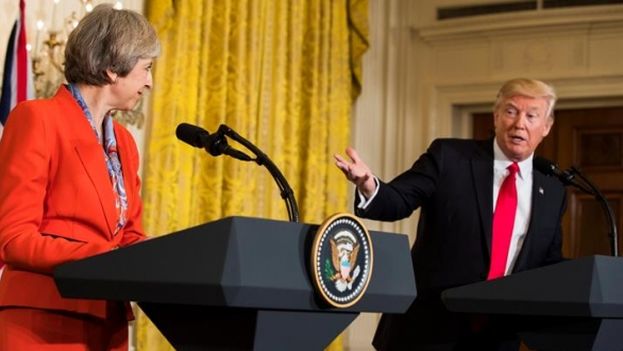
![]() 14ymedio, Carlos Alberto Montaner, Madrid, 29 January 2017 — Europe is terrified by Donald Trump’s triumph. it fears the vision of the American friend, the primus inter pares.
14ymedio, Carlos Alberto Montaner, Madrid, 29 January 2017 — Europe is terrified by Donald Trump’s triumph. it fears the vision of the American friend, the primus inter pares.
That fact has just been revealed by a macrosurvey by the French pollster Ipsos, which conducted it in 24 nations through interviews with 18,000 people. Ipsos is the largest European research company and one of the most serious.
The most pessimistic country is Spain. Eighty-four percent of Spaniards believe that Trump will be everyone’s worst president.
Among other reasons, the better-informed respondents say, he coincides too much with the communists of “Podemos” [We Can] and “Izquierda Unida” [United Left]. Like them, he opposes free-trade international treaties, he criticizes NATO and the European Union. He’s a protectionist, an isolationist and an interventionist. He tells businessmen where and how they should invest.
Trump confirms the intuition that the extremes — the populists on the left and the right — meet.
Following the negative opinion of the Spaniards come the 80 percent of the Britons, the 78 percent of the Germans and the 77 percent of the French.
What worries many Europeans and especially their governments?
They’re concerned by Trump’s support for Brexit and his close friendship with Nigel Farage, leader of the dissolution of ties between the United Kingdom and the European Union. By Trump’s criticism of Angela Merkel and his corrosive intromission into the affairs of the Group of 28.
Simultaneously, they’re leery of Trump’s favorable opinion of Vladimir Putin, the man who invaded Crimea and is threatening the Balkans. The same Ipsos survey found that 74 percent of Russians applaud Trump’s triumph.
But Russia is not the only country with a cheerful perception of the new White House tenant. Sixty-five percent of people in India also see this with optimism. Even more than in the United States, where 52 percent have a positive opinion and 48 percent a negative one.
Angela Merkel and François Hollande have a legitimate concern over the fate of the European Union. The great diplomatic feat of the 20th Century has been the gradual union of Europe, forged by Germany and France, the rivals who bled the continent from 1870 to 1945 in horrid wars.
First they proceeded cautiously, creating the European Community of Coal and Steel (1951). Those were the early years of the second post-World-War. It was the work of French visionaries Robert Schuman and Jean Monnet, of the Italian Alcide de Gasperi and the German chancellor Konrad Adenauer. They were joined by the Benelux countries (Belgium, Holland and Luxembourg).
The Germans and the French earnestly wanted to put an end to the habitual carnage in Europe. They would do so by creating common interests and legal institutions that would link the states and tie the hands of politicians.
Then came the European Economic Community (1958). The six original countries were eventually joined by another half dozen. And so they went, until in 1993 the EEC was replaced by the European Union, created in Maastricht after the dissolution of the Soviet Union and the socialist bloc.
Because Germany and France are two reasonably efficient countries, albeit endowed with huge and intricate bureaucracies, they instilled that characteristic into the new body. Essentially, however, they achieved their purpose: to banish exclusionary nationalism, maintain the peace and bring prosperity to all nations together, even if at a slower pace.
Naturally, this has been possible thanks to the political stimulus and the military protection of the United States, through its bases and the existence of NATO. And this is exactly what many Europeans fear will be weakened by Trump’s rise to the presidency of the United States.
F.D. Roosevelt, Truman and the rest of the American presidents correctly understood that the U.S. would benefit from a strong, united and peaceful Europe, with which to transact business and share responsibilities, the same way that, some years ago, Americans understood that they would benefit from the existence of the euro, because nothing muddies the commercial waters than the existence of weak and erratic monetary signs.
So it was until Trump settled in the White House. He was a politician with a different, old-fashioned message that could spoil everything. That is why Europe is terrified. The world’s leading power has changed the signs and rules of the game. Europe fears the dissolution of a matrimony that has been extraordinarily fruitful for the past 72 years. It would be terrible if something like that happened.
